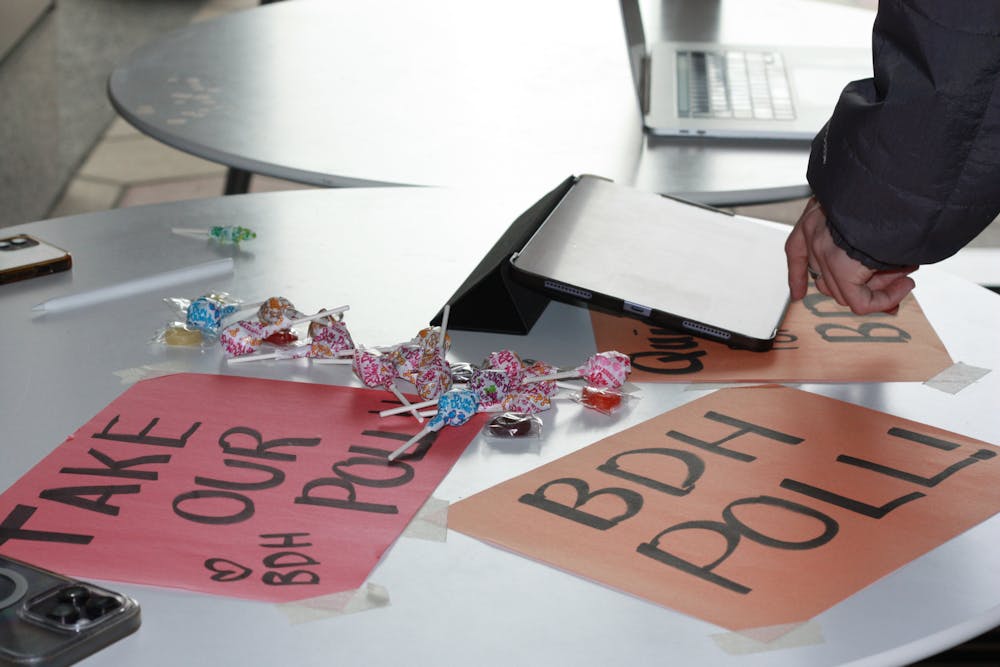Welcome to The Herald’s fall 2023 poll. Between Oct. 10 and 12, Herald staffers surveyed over 1,100 undergraduate students on topics ranging from demographics and lifestyle to support for campus and national leaders. Some of the poll’s notable findings are highlighted below. You can explore the data further using our interactive site.
The Herald conducts a campus-wide poll each semester to identify trends in student opinion and experiences. Our questions are selected by Herald editors, and the data analysis and design are conducted with the support of The Herald’s Tech Team. Findings from our spring 2023 poll are available here.
Nearly half of all respondents reported having been rejected from a club or student group at Brown.
Some students have called for campus student groups to be more inclusive, citing what they characterize as inequitable factors in club applications, as well as the professional advantages that membership in student groups can bring. This sentiment is not confined to Brown — students at Cornell, Penn and Yale have also criticized the exclusive club culture at their respective institutions.
Nearly 30% of poll respondents reported that they had never used the Rhode Island Public Transit Authority’s network of buses and other public transportation services. A similar share of respondents said that they rarely use the system, and an additional 33% reported they take the RIPTA either a couple times per semester or a few times a month. Seven percent said they take the RIPTA weekly, and less than 1% reported using the RIPTA daily.
Brown faculty, staff and students can ride for free on the RIPTA system using their Brown ID. RIPTA tracks these swipes and bills the University on a monthly basis, according to the University’s website. Brown is one of nine higher education institutions in the state that participate in RIPTA’s University Pass Program.
The share of students reporting never taking the RIPTA was 10 percentage points higher among those who do not receive any financial aid from the university, as compared to those receiving grants covering some or all costs.
Eleven percent of respondents receiving grants covering all costs reported taking the RIPTA weekly, compared with only 6% and 7% of students receiving no financial or grants covering some costs, respectively.
Beyond Brown students’ use of RIPTA, organizations like Sunrise Brown have protested RIPTA’s decision not to continue its fare-free pilot program, which removed the fare from the R-Line, RIPTA’s highest-ridership bus line.
RIPTA spokesperson Cristy Raposo Perry previously told The Herald the pilot cost the agency $5.7 million in total, exceeding the $2.5 million allocated to the program by the state’s General Assembly. The discrepancy between the program’s cost and RIPTA’s budget made it “not financially feasible” for the agency to continue the program, Raposo Perry wrote in an email to The Herald last month.
Four percent of poll respondents reported they strongly approve of President Joe Biden’s performance, and just over 40% reported they somewhat approve. Around 23% of respondents said they either somewhat disapprove or strongly disapprove, while roughly one-third reported either no opinion or that they neither approve nor disapprove of his performance.
A poll conducted last fall by the Harvard Kennedy School’s Institute of Politics found that among Americans aged 18-29, 41% approved of Biden’s performance as president and 56% disapproved.
The Herald found lower rates of approval for Biden among first-generation undergraduates. Around 31% of first-generation respondents said they strongly approve or somewhat approve of Biden’s performance, compared with about 46% of students who are not first-generation. More first-generation students expressed somewhat or strong disapproval for Biden — 31% of first-generation students expressed disapproval, compared to 21% of students who are not first-generation.
About 30% of poll respondents reported they do not use ChatGPT or similar tools in their academic studies. Of students who reported using artificial intelligence-powered chatbots, the majority said they used ChatGPT as a search engine or to answer conceptual questions.
The emergence of these new technologies has sparked conversations about academic integrity at Brown, with professors debating whether to allow students to use AI when completing assignments in their courses.
In an August letter by Provost Francis Doyle shared with the Brown community, Doyle announced a series of campus-wide discussions to explore “the impact of AI on how we live, work and educate the next generation.”
“As we identify the ways in which AI can enhance academic activities for faculty and student success and administrative activities for staff, we must also ensure these tools are understood and used appropriately and ethically,” Doyle wrote in his letter.
According to a BestColleges survey conducted in March, roughly one in five American college students polled reported using AI to complete their assignments. Thirty percent of those who said they used AI in their schoolwork reported using AI to complete the “majority” of their assignments.
Over 40% of poll respondents reported they strongly or somewhat disapprove of how the Undergraduate Finance Board is handling its job, compared to 10% and 8% of respondents who reported they strongly or somewhat disapprove of the Undergraduate Council of Students and their year’s Class Coordinating Board, respectively.
After spending the vast majority of its $1.2 million surplus last year, UFB faced a $1.5 million gap between the funding requested by student groups and the amount it could distribute. Despite an increase in the student activity fee from $286 to $300, clubs have faced lowered budgets and some have had to downsize their operations — including the Brown Concert Agency, which announced in September that Spring Weekend 2024 will be one day rather than two.
More than one-third of respondents who are seniors reported being in a long-term relationship, compared with 30% of juniors, 22% of sophomores and 14% of first-years. The sophomore class had the greatest share of respondents who were single and looking for a relationship, at 28%.
These results are roughly consistent with those from The Herald’s fall 2022 poll, which found that 36% of seniors, 25% of juniors, 23% of sophomores and 16% of first-years were in a long-term relationship.
This semester’s poll found that approval of President Christina Paxson P’19 P’MD’20 was highest among the junior class, with 29% of the class of 2025 reporting they strongly or somewhat approve of Paxson’s performance as University president — compared with just under 26% of respondents overall.
Roughly half of students reported they have no opinion or neither approve nor disapprove of Paxson’s performance, at 21% and 28% respectively. Neither approve or disapprove was a new survey response option this year, impacting the proportion of students who may have previously indicated approval, disapproval or “no opinion.”
The Herald conducted this poll as students were first responding to the recent outbreak of violence in Israel and Gaza that followed the Hamas attack in southern Israel on Oct. 7.
Charlie Clynes was the managing editor of digital content on The Herald's 134th Editorial Board. Previously, he covered University Hall and the Graduate Labor Organization as a University News editor.

Sam Levine is a University News editor from Brooklyn, New York covering on-campus activism. He is a senior concentrating in International and Public Affairs.

Rhea Rasquinha is a Metro editor covering development and infrastructure. She also serves as the co-chief of illustrations. She previously covered College Hill, Fox Point and the Jewelry District. Rhea is a senior from New York studying Biomedical Engineering.





